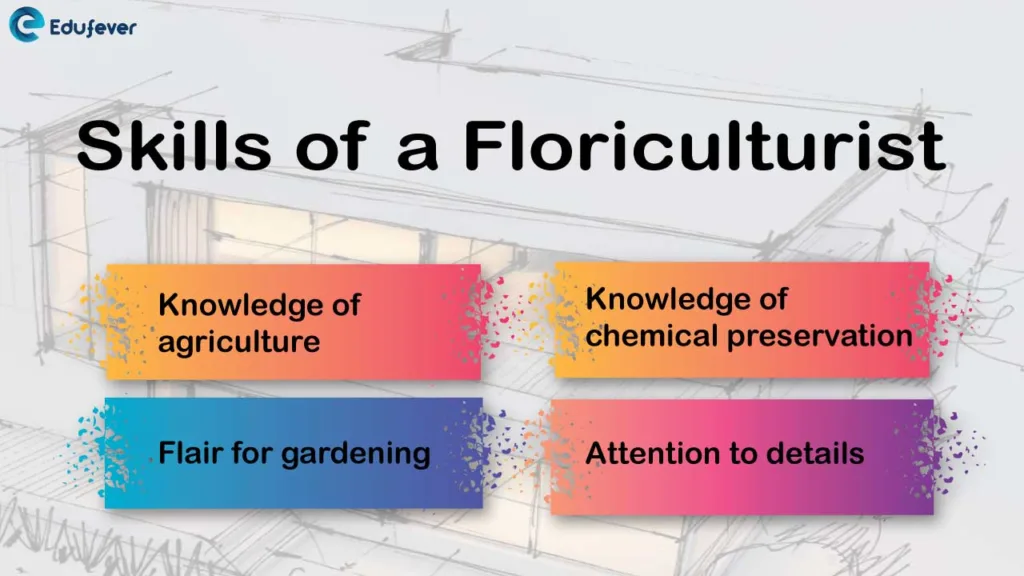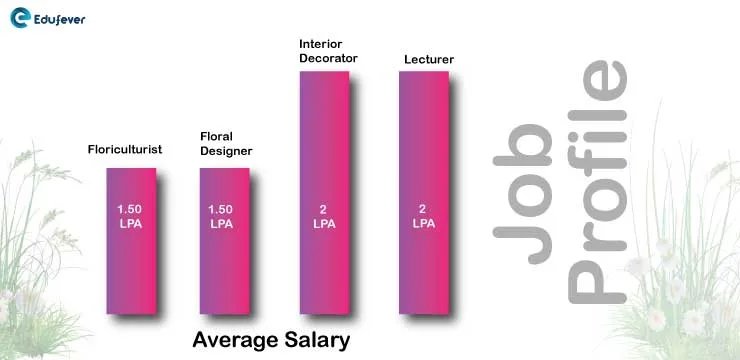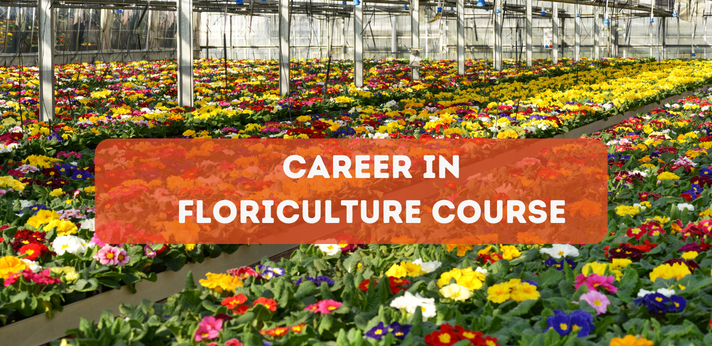India is considered an agricultural country, so agriculture-related careers have gained some importance and popularity. Floriculture or flower farming is one among them. Since any business related to flowers is vital in helping India acquire foreign currencies faster, Floriculture is the right profession for those who love flowers. The following article will briefly explain the career in floriculture in India and the floriculture jobs available after taking floriculture courses.
Floriculture is a discipline of horticulture that deals with flowers and ornamental plants. These flowers can be used for direct sale or as raw material in perfumes and cosmetics. Growing plants from seeds, cutting, budding, and grafting are also covered in this field. Through this article, various aspects of a Career in Floriculture are discussed.
[Index]
Quick Facts
Below, we have mentioned a quick summary of the floriculture course. Let’s take a look.
| Particulars | Description |
|---|---|
| Course Name | Bachelor of Science in Floriculture and Landscaping Master of Science in Floriculture and Landscaping Doctor of Philosophy (PhD) in Floriculture and Landscaping |
| Course Duration | UG: 3 Years PG: 2 Years PhD: 3 Years |
| Eligibility | UG: 10+2 PG: Master’s degree |
| Career Options | Garden centre manager, Researcher, Wholesale Florist, Floral Designer |
What is Floriculture?
Floriculture is a broad part of horticulture that studies the science of flowers and ornamental plants and their cultivation and management process. The discipline is also concerned with investigating rare breeds and adding colours to flowers with the introduction of genetic technology.
Even though the name floriculture suggests the farming of flowers, this field covers studies about modern tissue culture, the latest farming methods, formulation of harmless pesticides, polyhouse farming, etc. Those who focus on floriculture are known as floriculturists. Floriculturists are capable of designing and forming beautiful landscapes and gardens. Their duties range from earth science and plant technologies to differentiating flowers based on smell.
Various Floriculture Courses in India
A Bachelor’s Degree in life sciences is a must to enter this field. One can earn a degree in the following courses to work as a floriculturist or make a career in floriculture.
| Course Name | Duration |
|---|---|
| Bachelor of Science in Floriculture and Landscaping | Two year |
| Master of Science in Floriculture and Landscaping | Three years |
| Doctor of Philosophy (PhD) in Floriculture and Landscaping | One year |
| Diploma in Floriculture | Six months |
| Certificate Courses in Floriculture | 6 months |
Admission Procedure
- Candidates should have passed 10+2 with Physics, Chemistry and Biology, Maths or Agriculture with a minimum of 50% aggregate marks.
- The admission will be made based on the All India Entrance Examination or the entrance examination conducted by various universities.
- Admission to the master’s course will be made through the All India Entrance Examination (ICAR AIEEA) conducted by the Indian Council for Agricultural Research (ICAR).
Eligibility Criteria
Below we have mentioned the eligibility criteria for the floriculture course. Let’s take a look.
| Particulars | Description |
|---|---|
| Qualification | 10+2 with Physics, Chemistry and Biology, Maths or Agriculture |
| Qualification Marks | Candidates must score a minimum of 50% aggregate marks. |
Top Colleges in India Offering Careers in Floriculture
Many colleges in India pursue this course. Some of the best colleges in India offering Careers in Floriculture:
| College Name | Location |
|---|---|
| Indian Agricultural Research Institute | Delhi |
| Tamil Nadu Agricultural University | Tamil Nadu |
| Punjab Agricultural University | Ludhiana |
| GB Pant University of Agriculture and Technology | Uttrakhand |
| Yashwant Singh Parmar University of Horticulture and Forestry, Solan | Himachal Pradesh |
| Yashwntrao Chavan Maharashtra Open University, Nasik | Maharashtra |
| Khalsa College | Punjab |
| Kerala Agricultural University | Kerala |
| Jawaharlal Nehru Krishi Vishva Vidyalaya | Jabalpur |
| University of Agricultural Sciences | Bangalore |
Job Opportunities for Floriculture course
The floriculture industry is not as developed as it should have been in India, so there is hope for its expansion. The demand for cut and live plants is increasing with the increased standard of living and people’s awareness. Flowers are the largest in amount among the other exporting things when countries like Sweden, Vietnam, Holland, Thailand, and Israel are considered. Many fragrance flowers like rose, jasmine and more can be produced quickly, so extraction plants can be established to meet the increasing demand for the cosmetic and soap industry.
A floriculturist can easily find a job under the Indian Council of Agriculture (ICA). Various museums, national gardens, research institutions, and universities offer multiple career opportunities for a floriculturist. One can start their own business or research after earning a pass rank in Indian Agricultural Service (IAS) exam.
Job Profile
| Garden centre manager | Agronomist |
| Researcher | Landscape architect |
| Wholesale Florist | Cultivator |
| Soil tester | Procurement Specialist |
| Floral Designer | Lecturer |

Roles of a Floriculturist
- Growing and harvesting flowers, foliage and seeds. You will look after the growth and production of flower-bearing plants, ornamental foliage, and seeds for commercial purposes.
- Managing the farming environment takes external factors into account. You must ensure conditions conducive to cultivation, considering climate, irrigation, temperature, fertility etc.
- You are treating and preventing diseases in plants. The floriculturist always has to be alert about the health and well-being of the plants. Plants tend to catch disease easily in certain climates, and the floriculturist sometimes needs to eliminate such risks proactively. Adequate and timely use of chemicals and fertilisers can help you protect the plants.
- Harvesting the produce and post-harvest care of plants. During harvesting season, you must create favourable conditions to store the produce. This practice ensures the longevity of the flowers and foliage.
- Developing business through meetings and exhibitions. Before the crops become unusable, you must meet people to inform them of the crops’ quality and collect sales orders. Interacting with prospective buyers might not be your strongest suit, but it needs to be done to ensure the commercial viability of the occupation.
Skills of a Floriculturist
- Knowledge of agriculture
- Attention to details
- Flair for gardening
- Knowledge of chemical preservation

Average Salary
Below we have mentioned the average salary for floriculture in India:
| Job Profile | Average Salary |
|---|---|
| Floriculturist | 1.50 LPA |
| floral designer | 1.50 LPA |
| Interior decorator | 2 LPA |
| Lecturer | 2 LPA |

Top Recruiting Companies
The following are the top recruiting companies:
- Indian Council for Agricultural Research (ICAR)
- National Botanical Research Institute.
- Defence Institute of Bio-Energy Research.
- Indian Agricultural Research Institute.
- Birla Floriculture.
- Turbo Industries Ltd.
Frequently Asked Questions (FAQs)
What is the scope of a floriculturist?
The scope of a floriculturist is good as they can get employed under the Indian Council of Agriculture.
What are the careers in the floriculturist industry?
The following are the careers in the floriculturist industry:
>Garden centre manager
>Researcher
>Wholesale Florist
>Cultivator
>Floral Designer
>Lecturer
What are the skills of a Floriculturist?
The following are the skills of a floriculturist:
>Knowledge of agriculture
>Attention to details
>Flair for gardening
>Knowledge of chemical preservation
What are the roles of a Floriculturist?
The following are the roles of a floriculturist:
>Growing and harvesting flowers, foliage and seeds. You will look after the growth and production of flower-bearing plants, ornamental foliage, and seeds for commercial purposes.
>Managing the farming environment takes external factors into account. >You must ensure conditions conducive to cultivation, considering climate, irrigation, temperature, fertility etc.
>Treating and preventing diseases in plants. The floriculturist always has to be alert about the health and well-being of the plants. Plants tend to catch disease easily in certain climates, and the floriculturist sometimes needs to eliminate such risks proactively. Adequate and timely use of chemicals and fertilisers can help you protect the plants.
